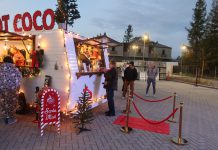The Dec.16 meeting of the Windsor Town Council ended much like the previous one, with the council still deadlocked on how to fill the vacant council seat left when Dominic Foppoli was elected as the town’s at-large mayor.
Foppoli and Councilmember Debora Fudge are in favor of appointing someone to fill the two-year term, with Vice Mayor Sam Salmon and Councilmember Esther Lemus in favor of holding a special election.
At the previous meeting, council members decided to move forward with both options, hoping they could reach a consensus at this meeting. An application process was opened for possible appointment and they planned to discuss possible election options, with Lemus asking for a budget report from town staff to help get a fuller picture of the impact of the costs of the special election, estimated to be between $62,00 and $100,000.
Jeneen Peterson from the town gave a preliminary set of numbers and fiscal forecast, which she repeatedly reminded everyone were extremely preliminary and not finalized. Budget and fiscal presentations usually come later in the year.
While the numbers are certainly less than rosy given the long-term impacts of the COVID-19 pandemic, they didn’t do anything to sway the two pro-election council members, primarily because it’s impossible at this stage to quantify what programs might be sacrificed to pay for the election.
Town Manager Ken MacNab added a few other thoughts for the council members to consider.
“This is a forecast, we’re seeing a preliminary version, but it conveys the message of heading into a period where expenditures will exceed forecasted revenues and we’ll have to take actions to address that,” he said.
Our reserves will dip below 25 and it is time to exercise prudence. Clearly in a budget of millions of dollars an election of $100,000 is probably manageable, but something else will have to give.
“However, I would also like you to consider the intangible costs,” he continued. “If we go to a special election, that will mean at least six months of only four members (on the council), and (doubling up on) regional committee assignments — and if we can’t fill one of those committee seats, what opportunities might we be missing out on? We have a budget process coming up, the Town Green Civic Center project and other important decisions, and certainly it would be my preference for a full council so there would be as much input as possible. We have to consider what is the potential for a two-two split and if we aren’t able to move business forward. We’re focused on the dollar cost but the intangibles, in the back of my mind, need to be considered.”
Fudge also mentioned the additional strain on town staff — particularly the town clerk’s office — to run the election.
Ultimately though, Lemus and Salmon remained on one side, and Fudge and Foppoli on the other.
Salmon believes an election is a “central function of a town’s governance,” and he also expressed unhappiness at emails from citizens which suggested the person filling the seat should be someone with experience in governance, claiming it “felt like an agenda.”
Lemus made a strong point that she doesn’t “believe anything (is) wrong with an appointment process. It is legal, lawful and ethical and it’s a tool that the council has it at its disposal. My position in this instance does not reflect on the appointment process,” she said. “This, no way in my mind, sets a precedent for the future. Any future body can make this decision all over again.”
Fudge felt strongly that that the finances are important to consider, and she’s worried about long-term council deadlock and added stress on town staff.
Foppoli believes that the town elected the council members “to make the difficult decisions,” and is also concerned about the drain on town staff and town resources. He also, however, tried hard to offer up some alternative ideas to try to break up the deadlock, including asking appointees to promise not to run for reelection, only appointing candidates from districts that won’t be up for election in two years.
Now, it becomes all about timing. The next council meeting is scheduled for Jan. 6, 2021. However, there are dates coming up that complicate matters.
The council has until Jan. 31 to either appoint someone or call for a special election. If the deadlock persists until Jan. 31, it will default to a special election.
If an election isn’t called by Jan. 10, however, then the town will miss the May date for a (mail-only) election, and the election will happen in August. However, if the council also deadlocks over what type of election to have (mail-in only versus in-person), then it will end up as a regular November election. Since it takes 30 days to certify an election, it would be September or October before a new council person is seated, leaving the council with only four members for most of the year and leaving whoever is elected with barely a year in their term.
But, with the deadlock in place, the council will continue to move forward on two fronts. At the Jan. 6 meeting, staff will have resolutions prepared for both calling a special election and moving forward with an appointment process, on the off chance that a consensus can be reached.
Other items
A few other items were also decided at the council meeting:
- Three speed limit changes and one speed zone boundary were changed. The three limit changes are: Arata Lane-Hembree Lane (decrease 35 to 30 mph), Conde Lane (decrease 35 to 30 mph) and East Shiloh Road (decrease 45 to 40 mph). The speed zone boundary change is: Hembree Lane, the southern boundary is moved from Wilson Lane to Victory Lane.
- A public hearing on raising fire impact fees was continued until February.
Editor’s note: a separate story on the annual housing report will be published shortly.








